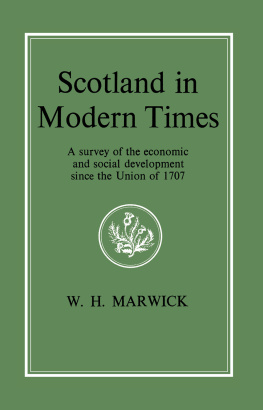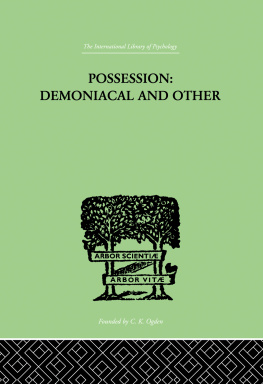First published in 1964 by
Frank Cass and Co. Ltd.
Published 2013 by Routledge
2 Park Square, Milton Park, Abingdon, Oxon OX14 4RN
711 Third Avenue, New York, NY, 10017, USA
Routledge is an imprint of the Taylor & Francis Group, an informa business
W. H. Marwick
ISBN 13: 978-0-714-61342-0 (hbk)
THIS work does not profess to be a definitive history of the economic and social development of modern Scotland, nor does it attempt an analysis in terms of modern economic theory. Its aim is the humbler one of providing a mainly factual outline of the results of study, mainly within the last forty years, of these aspects of Scottish history, hitherto scattered through many specialised books and articles. It makes no pretension to original research, except on minor points relating to the Victorian era, additional to those contained in my earlier book. Acknowledgments are made of the main sources used, both in the bibliography and in notes at appropriate points; a complete list would involve the citation of innumerable articles, reports, newspapers, etc. Much of the material is based on lectures delivered for the past ten years to the Second Ordinary Course in Economic History in the University of Edinburgh.
I also wish to thank the Geography Department of the University of Edinburgh for their kind help in the preparation of the maps.
W. H. MARWICK.
UNIVERSITY OF EDINBURGH,
September 1962.
SCOTLAND remained largely medieval in economic structure until the mid-eighteenth century. The Reformation, however important in the religious and ecclesiastical spheres, had little effect on the way of life of the ordinary man, and such changes as occurred in land ownership seem to have made little difference in agricultural conditions. The Union of Crowns affected trade and industry, on the whole prejudicially, but these were too undeveloped to affect the general economic situation vitally.
The economic consequences of the Union of Parliaments have been and still are hotly debated. To some it appears to have given Scotland every virtue but sobriety (which we are told no Act of Parliament can ensure); to others it is the root of all evils from which Scotland has subsequently suffered. Certainly it now seems that the picture of utter backwardness in 1707, which the literary charm of H. G. Graham has impressed on many readers, is exaggerated, and depends too much on the partial evidence of propagandist documents and travellers tales, often superficial and supercilious. Recent research, pioneered by Dr. G. P. Insh, and developed by such scholars as Professor Nef, Mr. Lythe and the Clows, indicates distinct commercial and industrial advance in the seventeenth century, even if mainly of what Mumford calls the eotechnic phase. The undoubtedly parlous condition of the early eighteenth century must in large part be attributed not to original primitiveness but to the setback given by the years of famine in the 1690s, the disaster of Darien and the Williamite War.
The Industrial Revolution is a term now rather blown upon, but seems appropriate to Scotland, in so far as that, within a generation or two, the way of life of the mass of the people was transformed. Concrete illustration may be found in a comparison of the two Statistical Accounts of the 1790s and the 1840s, or in such works as Senexs rambling reminiscences of Old Glasgow, and Cockburns more polished presentation of the transition in Edinburgh.
The Union of 1707 was due primarily to considerations of international politics, and was accepted by the majority of Scots mainly as a means of securing the Protestant Succession. The Jacobite revolts were in effect sideshows in the Second Hundred Years War with France. At the same time, it is true that economic issues were prominent in the terms of the Treaty, and some of its provisions were designed to mollify Scottish sentiment by concessions in trade and finance. The residue of the Equivalent, at last fructifying in the fostering of industry by the Board of Trustees, and the opening of the American colonies to Scottish merchants, were the two chief tangible gains.
The relationship between English and Scottish economic development has indeed been close, but not a one-way traffic. Even in the seventeenth century, despite friction and barriers raised by growing Mercantilism, trade across the Border expanded. Scots had already trodden the Johnsonian road to seek advancement in London; Nigel had many exemplars in real life in his quest of fortune in the south. William Paterson in his connexion with the foundation of the Bank of England (even if Clapham deems his share exaggerated) and of the Company of Scotland is but the most conspicuous; while John Holland the London merchant played an important part in founding the Bank of Scotland, and the ubiquitous Bevis Bulmer was active in mining enterprise in both countries. In the eighteenth century James Watt developed his inventions in Birmingham with the financial assistance of Boulton; he trained Murdoch; Macadams roadmaking and Rennies bridge-building were largely in the south. Conversely Roebuck of Sheffield was a pioneer of chemicals and founder of Carron; the Welsh Robert Owen made New Lanark the model factory of the new textiles, while Galloway Scots developed the cotton trade in Manchester; the Houldsworths of Derbyshire origin transferred their energies from cotton to ironfounding, and eventually for generations to the ironworks at Coltness, onetime seat of Sir James Steuart, doyen of Scots economists.
The Scots have always combined ardent nationalism with cosmopolitanism, and the reciprocal influence of Scotland and other countries has been of economic and cultural value to both. France in the Middle Ages, the Netherlands in the Age of Transition, Germany in the nineteenth century, the Scandinavian countries intermittently throughout, probably U.S.A. in the twentieth, are outstanding. From the economic standpoint the influence of the Dutch is noteworthy, in natural science, agriculture, architecture and law. Veere in Walcheren, once a great trading centre, now shrunk to a fishing port, still preserves tangible evidence of the Scots Staple in the Conciergerie of the Scots merchants. Leiden, once the haunt of the Scottish wandering scholar and Covenanting refugee, inspired the emergence of the Scottish Universities as pioneers of medical education.
Conversely, Scots have influenced economic development in Europe and other continents. The financial devices of John Law had for good or ill great effects on eighteenth-century France. Sweden received considerable immigration of Scots, industrialists and merchants as well as soldiers. Veterans of Gustav Adolfs campaigns have left Scots names among the landed gentry; Carnegie, Chalmers, Dickson and Keiller are names witnessing to the Scottish share in the growth of Goteborg as a port and industrial centre. The participation of Scots in the expansion of the British Empire will be amply illustrated in the subsequent narrative.





